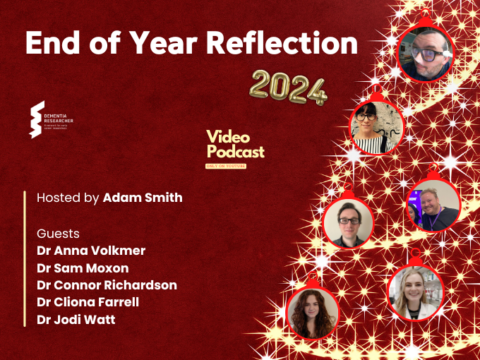Hello all and welcome back to my corner of the Dementia Researcher blogs! I have been doing some soul searching recently and I got to thinking about health. I remembered something that was mentioned in a recent podcast recording. I was lucky enough to sit down with some reputable people involved in the Race Against Dementia (RAD) initiative. One of the guests was talking about an interaction he had with Sir Jackie Stewart, the founder of the charity. He was recalling a conversation they shared where Sir Jackie expressed his frustration at how slow things seemed to move in dementia research. That was, I think, a part of the reason he started the charity. He wants to bring that F1 level of speed and innovation into the field.
However, dementia research has a wealth of very gifted scientists working tirelessly to try and make a difference. I understand Sir Jackie’s frustration but it is, unfortunately, a large and complex issue to try and unpick. Initiatives like RAD certainly can and are having an impact but this will still be quite a slow process. When you pair that fact with the predictions that cases of dementia will continue to increase, you’re left with quite a bleak picture showing a seemingly inevitable “pandemic” of dementia along with a vast array of chronic diseases. So how can we improve this image and try and feel a little better about our future?
I think the answer lies in proactivity. Dementia isn’t really an issue we should look to treat long term in a reactive manner. In our current situation, by the time a patient gets diagnosed the damage is done. It is normally too late to action any real therapy. All we can do is reactively try and manage their symptoms and make their life as good as possible. It is not an easy job and the people who do it are wonderful and make a big difference. However, we need to try and push towards a reality where it doesn’t have to be this way.
That’s why so much of the research around dementia is focussed on trying to find earlier hallmarks of the disease. If we can do that then maybe we can create a means for earlier diagnosis. A diagnosis that can be arrived at before the damage is too great. If we can do that then suddenly our therapies become far more effective. You could argue that this is still a reactive approach but in order to work, it relies on a more proactive approach of regular testing for some of those early markers. We can’t catch something early if we can’t look for it.
That is going to take time though so what can we do RIGHT NOW to be more proactive in this fight? The answer is simple. Prevention is better than cure. Can we take proactive steps to try and prevent as many cases of dementia as possible? The answer is yes… to some extent. If you are familiar with my podcast work here you will know that I am fascinated with how the way we live our lives (what we eat, how often we exercise, how well we sleep etc.) can impact on our risk of developing dementia. I have been fortunate enough to sit down with people who have studied this for many years and they all come to the same conclusion. Living a healthy lifestyle is one of the best ways to significantly reduce your risk of dementia.
This is harder than it sounds in 2022. Fast food is everywhere. In Liverpool where I live you can actually see a McDonalds from another McDonalds! We’re glued to our screens and so easily tempted by food loaded with stuff that shortens our lifespan because it tastes so damn good. More than that, when we eat junk food we grow bacteria in our gut and produce hormones that tell our brain we are still hungry and want MORE junk food. If we want to be proactive about reducing the load on our already stretched-thin healthcare service we need to address our lifestyle on a national scale.
In a recent podcast recording, a neurologist told me that the majority of dementia cases could be potentially prevented by a nationwide plan to create a healthy population. It sounds unrealistic but you only need to look at countries that don’t have the assault on their health that is the standard western diet and you find the incidence of dementia pales in comparison to that of the land of McDonalds and Netflix. In Africa, India, and South Asia you can find dementia death rates that are over ten times lower than those seen in America or the U.K. Genetics alone does not count for that difference. Saturated fats, trans fats, artificial additives… take an hour or so to look at the research and you soon find the catastrophic effects these have on our brain health.
If we really want to all do our bit in this fight we can start at home. We can address our own health knowing that, by reducing our risk, we also make things easy for those working tirelessly to find the scientific breakthroughs we so desperately need. My podcasts tend to lean towards the benefits of a plant based diet for brain health but that is by no means the only solution. Unprocessed, healthy foods with the right amount of exercise is the best place to start. Fighting dementia requires a global effort. You don’t have to be a scientist or healthcare specialist to do you bit. Start with what’s on your plate. Eat healthy, feel better and protect your brain. It is precious.

Dr Sam Moxon
Author
Dr Sam Moxon is a biomaterials scientist at the University of Manchester. His expertise falls on the interface between biology and engineering. His PhD focussed on regenerative medicine and he now works on trying to develop 3D bioprinting techniques with human stem cells, so that we better understand and treat degenerative diseases. Outside of the lab he hikes through the Lake District and is an expert on all things Disney.

 Print This Post
Print This Post






[…] https://www.dementiaresearcher.nihr.ac.uk/guest-blog-are-we-proactive-enough-about-dementia/ […]